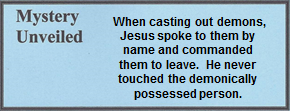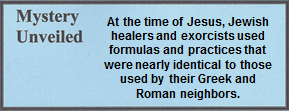06.03.03 Mk. 1:23-28 (See also Lk. 4:33-37) Jesus performed His first exorcism
MAN DELIVERED FROM A DEMON
23 Just then a man with an unclean spirit was in their synagogue. He cried out, 24 “What do You have to do with us, Jesus — Nazarene? Have You come to destroy us? I know who You are — the Holy One of God!”
25 But Jesus rebuked him and said, “Be quiet, and come out of him!” 26 And the unclean spirit convulsed him, shouted with a loud voice, and came out of him.
27 Then they were all amazed, so they began to argue with one another, saying, “What is this? A new teaching with authority! He commands even the unclean spirits, and they obey Him.” 28 News about Him then spread throughout the entire vicinity of Galilee.
The methods of casting out demons used by Jewish exorcists and healers were strongly opposed by Jesus. They used a wide variety of tactics that supposedly achieved success, including the use of animal organs, smoke, magical incantations, tricks, and the name of Solomon. This was in sharp contrast to Jesus who usually spoke the word and on rare occasion used mud and spit for a healing. Notice that the healing practices of the first century Jewish world were nearly identical to those practices that were commonly used by pagan healers. This reveals the magnitude to which Hellenism had penetrated into the core of Judaism. While it is believed by scholars that these practices were common knowledge, not all Jewish people accepted them; many preferring to call only upon the name of the Lord.
Then the young man questioned the angel and said to him, Brother Azariah, what medicinal value is there in the fish’s heart and liver, and in the gall?” He replied, “As for the fish’s heart and liver, you must burn them to make smoke in the presence of a man or woman afflicted by a demon or evil spirit, and every affliction will flee away and never remain with that person any longer.
Tobit 6:7-8[1]
“Be quiet.” Literally to be muzzled or gagged. [2] The demon could not speak even if he wanted to; Jesus politely but firmly commanded absolute and complete control. While Jewish exorcisms involved magical formulas,[3] Jesus cast out demons simply with His word.

Ironically, the Jewish elite decided not to recognize Jesus for who He was, but the terrorized demons immediately recognized Him – the One who would deliver people from their strongholds and influence (Rev. 20:1-3). Unfortunately, English translations miss the sense of terror the demons expressed in this passage.

Here, for the first time, Jesus exercised His divine power over demonic spirits. Demons influence and sometimes control the thinking, speaking, feeling, and actions of their victims and, therefore, the demon’s desires are revealed.[4] The approach Jesus used was uniquely different from others who practiced exorcisms. He always spoke to the demons but never touched the possessed persons. This is in sharp contrast to the many times he touched the sick, infirm, and even the dead.
In the process of casting out demons, Jewish and pagan exorcists followed prescribed formulas and repeatedly called upon the name of their god to cast out demons. Some rabbis believed that, by their secret spells, they could command the services of spirits for good or evil.[5] An example is the magical spell, repeated for emphasis, in the book of Tobit. It reads,
As he went … he took the live ashes of incense and put the heart and liver of the fish upon them and made a smoke. And when the demon smelled the odor, he fled to the remotest parts of Egypt, and the angel bound him.
Tobit 8:2-3
It should be noted that in Greek thinking, demons were supernatural beings that could be either good or bad spirits,[6] but biblical writers identified the spirits only as evil.
[1]. Ben Sirach and Tobit belong to a classification of extra-biblical books known as the Apocrypha. These two literary works reflect the opinions of many Jewish people. See 02.02.03 “Apocrypha” for more information. The reader is reminded that quotations from non-biblical sources are not to be understood as being of equal authority with the biblical narratives. See 01.02.04.
[2]. Vincent, Word Studies in the New Testament. 1:165.
[3]. Tobit 5:7-8; Josephus, Antiquities 8.2.5 (45-49).
[4]. Pentecost, The Words and Works of Jesus Christ. 145.
[5]. Geikie, The Life and Works of Christ. 1:367.
[6]. New International Version Study Bible footnote on Luke 4:33.